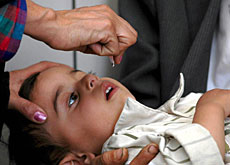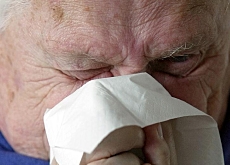Pandemic warnings spark rush for bird flu drug

Swiss pharmaceuticals giant Roche has been flooded with orders for Tamiflu, the only antiviral drug deemed to be efficient against the avian flu virus.
World Health Organization (WHO) warnings in February of a pandemic that could kill seven million people sparked an enormous global demand for the drug.
The deaths of 53 people in Asia from the H5N1 strain of avian flu are increasing the fears of governments and health authorities that the virus is acquiring the ability to spread more easily among humans.
As a result, 25 countries – including Switzerland – have heeded the WHO’s warnings and placed orders for the drug.
However, production takes 12 months: Britain’s order for 14.6 million five-day courses of treatment, for example, will take two years to fulfil.
Some scientists say this might be too late to prevent a pandemic, but Roche denies it is struggling with the heavy demand.
No guarantees
“There is no production bottleneck,” Martina Rupp, a spokeswoman for Roche, told swissinfo. “We increased production significantly last year, we will do so again this year and we have fulfilled all orders to agreed timelines.”
“We have however made it very clear that we cannot guarantee adequate supplies at the time of a pandemic so it’s key that countries start stockpiling well in advance.”
To satisfy demand from the United States, Roche is planning to open a new production plant in North America later this year.
Roche is also working on methods of synthesising the drug from scratch. At present Tamiflu is made from star anise, a plant which is in limited supply.
“The manufacturing process of Tamiflu is complex and takes a long time so it’s important that countries follow the WHO’s recommendation,” says Rupp.
Tough decisions
The WHO has been urging governments not to leave plans for coping with a pandemic until it is too late.
“It’s a fact that there’s not going to be enough Tamiflu available to meet the needs of everybody who’s going to want it,” Dick Thompson, communication officer in the communicable diseases section of the WHO, told swissinfo.
“The occurrence of a pandemic is going to call for some hard decisions – and we believe that it’s best to make those decisions now before there is an actual outbreak.”
Thompson is unequivocal when asked whether governments, especially richer governments, are doing enough. “Absolutely not,” he says. “The consequences of a pandemic are just too large to not speak about it.”
“We have to talk about this looming public health threat now even though there’s a real possibility there won’t be a pandemic anytime soon.”
Responsible partners
Pharmaceutical companies – with their duties to shareholders – have in the past been accused of exploiting fatal diseases, such as Aids, for profit.
Roche says it is working closely with governments and the WHO as a responsible partner and has come up with an innovative solution which will benefit poorer countries where the virus is most likely to break out.
“Our distribution policy is first come, first served,” says Rupp. “But we offer the capsules at a significantly reduced price to governments for their pandemic stockpiling.”
“Countries can buy capsules on the one hand or they can buy the API (active product ingredient), a powder which needs to be mixed with water and a preserving agent [before it is] distributed in small bottles.”
“When governments buy the API they get another price reduction – the API is half the price of the already reduced capsules.”
European reaction
“An influenza pandemic seems inevitable,” said Markos Kyprianou, the EU health commissioner last month as he launched the EU’s European Centre for Disease Prevention and Control (ECDC) in Stockholm.
The ECDC will coordinate efforts in the 25-member EU to control disease by identifying risks and providing advice. “Diseases know no borders, and so the fight against diseases should know no borders,” Kyprianou said.
He said the EU wanted its members to increase their orders of vaccines now to encourage drug companies to expand their capacity so that they could produce enough vaccines in the event of an outbreak.
Kyprianou added that the EU was also proposing a €1 billion (SFr1.5 billion) fund in case of a health crisis.
In April the Swiss government announced that it was drawing up emergency measures that would come into force in the event of a flu pandemic.
swissinfo, Thomas Stephens
The WHO says the H5N1 strain of bird flu has so far killed 37 people in Vietnam, 12 in Thailand and four in Cambodia.
The disease swept through eight Asian countries last year, devastating the poultry industry.
Global health officials fear it could mutate into a strain that could rival the 1918 Spanish flu pandemic that killed 20-40 million humans.
Avian flu was first seen in humans in 1997 in Hong Kong.
Almost all human cases are thought to have come from birds.

In compliance with the JTI standards
More: SWI swissinfo.ch certified by the Journalism Trust Initiative












You can find an overview of ongoing debates with our journalists here . Please join us!
If you want to start a conversation about a topic raised in this article or want to report factual errors, email us at english@swissinfo.ch.